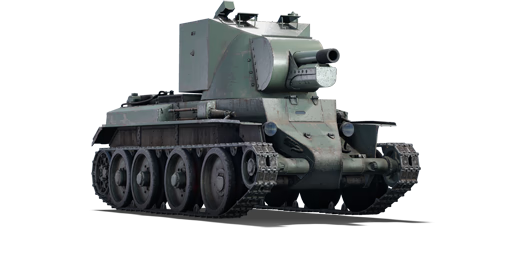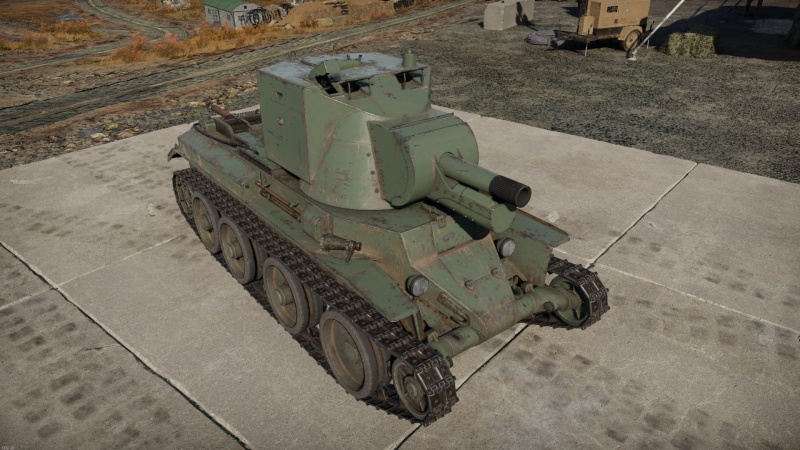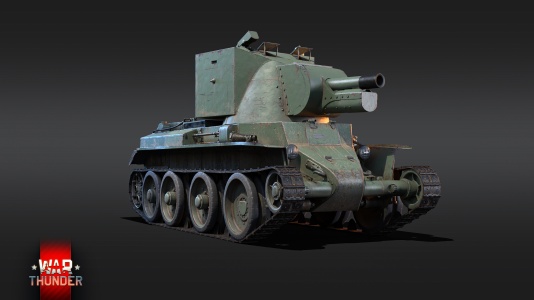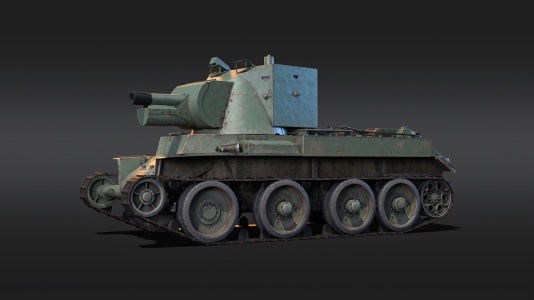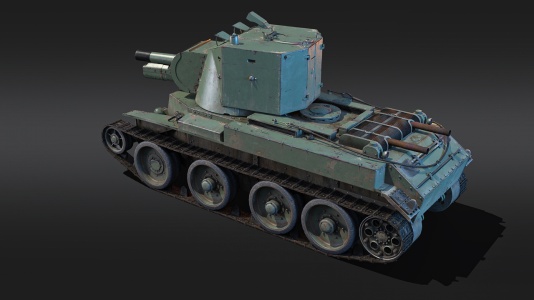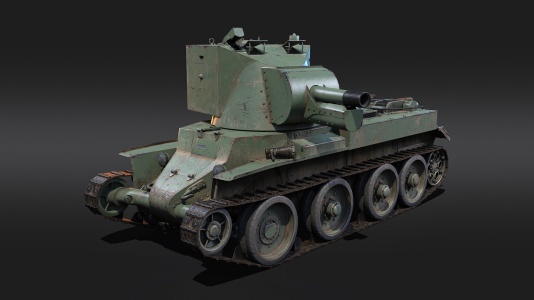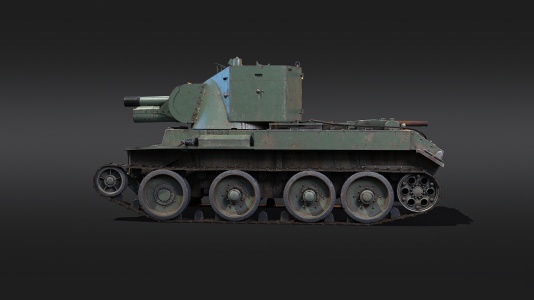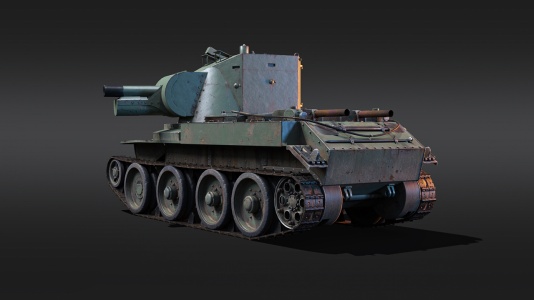Difference between revisions of "BT-42"
Colok76286 (talk | contribs) (Edits) |
(Updated) |
||
| Line 14: | Line 14: | ||
{{Specs-Tank-Armour}} | {{Specs-Tank-Armour}} | ||
<!-- ''Describe armour protection. Note the most well protected and key weak areas. Appreciate the layout of modules as well as the number and location of crew members. Is the level of armour protection sufficient, is the placement of modules helpful for survival in combat? If necessary use a visual template to indicate the most secure and weak zones of the armour.'' --> | <!-- ''Describe armour protection. Note the most well protected and key weak areas. Appreciate the layout of modules as well as the number and location of crew members. Is the level of armour protection sufficient, is the placement of modules helpful for survival in combat? If necessary use a visual template to indicate the most secure and weak zones of the armour.'' --> | ||
| − | When only looking at the hull alone, the BT-42 is exactly like any other BT-7 tank; but what makes it stand out among its "ancestors" is the turret - the Finnish upgraded its gun with a British QF 4.5-inch (114 mm) howitzer and installed it inside a new welded turret that somewhat resembles the infamous [[KV-2 (Family)|KV-2]] from the Soviet Union. But the common feature of BT tanks still persists on the BT-42, namely its poor protection; other than the | + | When only looking at the hull alone, the BT-42 is exactly like any other BT-7 tank; but what makes it stand out among its "ancestors" is the turret - the Finnish upgraded its gun with a British QF 4.5-inch (114 mm) howitzer and installed it inside a new welded turret that somewhat resembles the infamous [[KV-2 (Family)|KV-2]] from the Soviet Union. But the common feature of BT tanks still persists on the BT-42, namely its poor protection; other than the mantlet, any high-calibre machine gun will have no trouble penetrating its armour even at longer ranges, especially its hull. So be extra careful on where to appear in uptier battles where HMGs such as the M2HB start to be common. |
'''Armour type:''' <!-- The types of armour present on the vehicle and their general locations --> | '''Armour type:''' <!-- The types of armour present on the vehicle and their general locations --> | ||
| Line 38: | Line 38: | ||
The Finnish didn't upgrade the BT-42's powerplant as it was deemed sufficient, so it retained the same Mikulin M-17T engine and transmission. Players of the Soviet BT tanks should be well familiar with its excellent mobility at its rank, which lets the BT-42 flank its enemies with ease. | The Finnish didn't upgrade the BT-42's powerplant as it was deemed sufficient, so it retained the same Mikulin M-17T engine and transmission. Players of the Soviet BT tanks should be well familiar with its excellent mobility at its rank, which lets the BT-42 flank its enemies with ease. | ||
| − | {{tankMobility|abMinHp= | + | {{tankMobility|abMinHp=433|rbMinHp=354}} |
=== Modifications and economy === | === Modifications and economy === | ||
| Line 50: | Line 50: | ||
{{main|Psv.H/18 (114 mm)}} | {{main|Psv.H/18 (114 mm)}} | ||
| − | The most iconic feature of the BT-42 is the QF 4.5-inch howitzer from Great Britain (named "114 mm Psv.H/18" in Finnish service); although the revised turret that fits this very gun turns even slower than the original BT-7. If aimed properly, it can even hit tanks behind cover due to having the ballistics of a howitzer. | + | The most iconic feature of the BT-42 is the QF 4.5-inch howitzer from Great Britain (named "114 mm Psv.H/18" in Finnish service); although the revised turret that fits this very gun turns even slower than the original BT-7. If aimed properly, it can even hit tanks behind cover due to having the ballistics of a howitzer. |
{| class="wikitable" style="text-align:center" width="100%" | {| class="wikitable" style="text-align:center" width="100%" | ||
| Line 61: | Line 61: | ||
|- | |- | ||
! ''Arcade'' | ! ''Arcade'' | ||
| − | | rowspan="2" | 22 || rowspan="2" | -5°/+25° || rowspan="2" | ±180° || rowspan="2" | | + | | rowspan="2" | 22 || rowspan="2" | -5°/+25° || rowspan="2" | ±180° || rowspan="2" | - || 5.7 || 7.9 || 9.6 || 10.6 || 11.3 || rowspan="2" | 13.00 || rowspan="2" | 11.50 || rowspan="2" | 10.60 || rowspan="2" | 10.00 |
|- | |- | ||
! ''Realistic'' | ! ''Realistic'' | ||
| Line 115: | Line 115: | ||
* Lightly armoured | * Lightly armoured | ||
| − | * Big profile | + | * Big profile |
* Slow turret traverse | * Slow turret traverse | ||
* Long reload time | * Long reload time | ||
| Line 165: | Line 165: | ||
<references /> | <references /> | ||
| − | {{Sweden | + | {{Sweden light tanks}} |
Revision as of 21:17, 13 October 2023
Contents
Description
The BT-42, officially known as "15 tonnin rynnäkkötykkipanssarivaunu BT-42 (15-ton assault gun tank BT-42)", was a modified variant of the Soviet BT-7 light tanks which were captured by Finland during the Winter War and Continuation War; due to the lack of firepower of the 37/45 mm gun on original BT tanks and the dire need for tanks to defend Soviet forces, some of these BT tanks were then upgraded with a British-aided 4.5 inch howitzer and new turret that housed this very gun. These tanks were then deployed to the battle against Soviet forces; only one of these 18 tanks eventually survived the war and the subsequent scrapping of the surviving tanks.
The BT-42, introduced in Update Update "Fire and Ice", is perhaps one of the most iconic light tanks in Finnish service as well as being a "meme" tank among players due to its screen time in a Japanese animation film. This captured BT-7 modified with a huge QF 4.5 inch howitzer will strike fear into enemies with its fearsome firepower while still retaining the iconic fast and nimble playstyle of a BT light tank.
General info
Survivability and armour
When only looking at the hull alone, the BT-42 is exactly like any other BT-7 tank; but what makes it stand out among its "ancestors" is the turret - the Finnish upgraded its gun with a British QF 4.5-inch (114 mm) howitzer and installed it inside a new welded turret that somewhat resembles the infamous KV-2 from the Soviet Union. But the common feature of BT tanks still persists on the BT-42, namely its poor protection; other than the mantlet, any high-calibre machine gun will have no trouble penetrating its armour even at longer ranges, especially its hull. So be extra careful on where to appear in uptier battles where HMGs such as the M2HB start to be common.
Armour type:
| Armour | Front (Slope angle) | Sides | Rear | Roof |
|---|---|---|---|---|
| Hull | 5 mm (61°) Upper front glacis 20 mm (18°) Driver's hatch 20 mm (5-52°) Lower front glacis |
20 mm Driver compartment 15 + 4 mm Fighting & engine compartments |
10 mm (55°) Upper glacis 13 mm (15°) Centre plate 13 mm (58°) Lower glacis |
10 mm 4 mm Engine vents |
| Turret | 16 mm Turret front 16 mm Gun mantlet |
16 mm | 16 mm | 9 mm |
Notes:
Mobility
The Finnish didn't upgrade the BT-42's powerplant as it was deemed sufficient, so it retained the same Mikulin M-17T engine and transmission. Players of the Soviet BT tanks should be well familiar with its excellent mobility at its rank, which lets the BT-42 flank its enemies with ease.
| Game Mode | Max Speed (km/h) | Weight (tons) | Engine power (horsepower) | Power-to-weight ratio (hp/ton) | |||
|---|---|---|---|---|---|---|---|
| Forward | Reverse | Stock | Upgraded | Stock | Upgraded | ||
| Arcade | 55 | 11 | 15 | 433 | 763 | 28.87 | 50.87 |
| Realistic | 50 | 10 | 354 | 400 | 23.6 | 26.67 | |
Modifications and economy
Armaments
Main armament
The most iconic feature of the BT-42 is the QF 4.5-inch howitzer from Great Britain (named "114 mm Psv.H/18" in Finnish service); although the revised turret that fits this very gun turns even slower than the original BT-7. If aimed properly, it can even hit tanks behind cover due to having the ballistics of a howitzer.
| 114 mm Psv.H/18 | Turret rotation speed (°/s) | Reloading rate (seconds) | |||||||||||
|---|---|---|---|---|---|---|---|---|---|---|---|---|---|
| Mode | Capacity | Vertical | Horizontal | Stabilizer | Stock | Upgraded | Full | Expert | Aced | Stock | Full | Expert | Aced |
| Arcade | 22 | -5°/+25° | ±180° | - | 5.7 | 7.9 | 9.6 | 10.6 | 11.3 | 13.00 | 11.50 | 10.60 | 10.00 |
| Realistic | 3.6 | 4.2 | 5.1 | 5.6 | 6.0 | ||||||||
Ammunition
| Penetration statistics | |||||||
|---|---|---|---|---|---|---|---|
| Ammunition | Type of warhead |
Penetration @ 0° Angle of Attack (mm) | |||||
| 10 m | 100 m | 500 m | 1,000 m | 1,500 m | 2,000 m | ||
| akr 32/41 | HE | 25 | 25 | 25 | 25 | 25 | 25 |
| hkr 42/C | HEAT | 115 | 115 | 115 | 115 | 115 | 115 |
| Shell details | ||||||||||||
|---|---|---|---|---|---|---|---|---|---|---|---|---|
| Ammunition | Type of warhead |
Velocity (m/s) |
Projectile mass (kg) |
Fuse delay (m) |
Fuse sensitivity (mm) |
Explosive mass (TNT equivalent) (kg) |
Ricochet | |||||
| 0% | 50% | 100% | ||||||||||
| akr 32/41 | HE | 350 | 14.4 | 0 | 0.1 | 2 | 79° | 80° | 81° | |||
| hkr 42/C | HEAT | 357 | 13.5 | 0.05 | 0.1 | 2.55 | 62° | 69° | 73° | |||
The stock akr 32/41 round is an HE shell, although its velocity at barely supersonic makes it unsuitable for hitting mobile targets at distance; but thanks to its 2 kg of explosives, if it hits the roof armour of tanks or spots that will cause overpressure, it can make sure the crew will be knocked out right away, let alone a near-miss to truck-based SPAAs at its rank with minimal protection; alternatively, the curve ballistic also means bad news for enemies who took cover at longer ranges- there are still chances of being hit in the roof.
The only researchable round, hkr 42/C, is a HEAT round. While it can functionally replace the stock shell and penetrates up to 115 mm of armour at any given range, it has very few spalling against heavier targets, so make sure to hit the ammunition racks of enemy vehicles.
Ammo racks
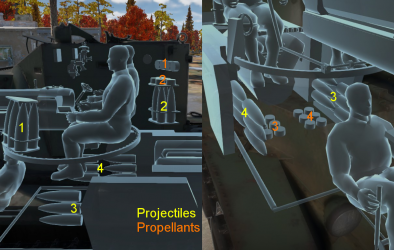
| Full ammo |
Ammo type |
1st rack empty |
2nd rack empty |
3rd rack empty |
4th rack empty |
Visual discrepancy |
|---|---|---|---|---|---|---|
| 22 | Projectiles Propellants |
18 (+4) 18 (+4) |
13 (+9) 13 (+9) |
7 (+15) 7 (+15) |
1 (+21) 1 (+21) |
No |
Notes:
- The BT-42 uses two-piece ammunition, composed of projectiles (yellow) and propellant charges (orange). Both have separate racks.
- Shells are modeled individually and disappear after having been shot or loaded.
- Turret empty: 13 (+9) shells.
Usage in battles
Although the name "BT" still exists on the BT-42, the only thing left of a BT tank is the chassis itself; the biggest difference is the huge turret, some might even compare it to a KV-2 as they shared some similarities in terms of the angular shape. While some might think the Finnish installed a medium-calibre cannon, upon closer inspection, they will know that it is not a good idea running into the QF 4.5-inch howitzer at 114 mm; although having only HE or HEAT at its disposal and barely having supersonic muzzle velocity, a precise hit on overpressure weakspot or even a near miss from the HE shell will very likely knock down the target right away, while having more explosive content than HE, HEAT is more suitable for direct hits on heavy targets such as the infamous B1 series or KV series at higher tiers. Thanks to the excellent mobility of the BT chassis, it can make sure that it would arrive at vantage points at the first place, alternatively flanking enemies from their sides and places they didn't expect. Its 13 second base reload time does give the BT-42 extra time to take out crippled targets as vehicles at this tier with even larger calibre takes up to 20 seconds for the next shot. For those who didn't finish off unprotected targets in one take, the bad news is BT-42 doesn't comes with any co-axial machine guns so do make sure your shot blows the target up into pieces, else you might become the prey instead.
Mobility is the best friend of the BT-42 and it still trades protection for its speed, showing up in front of tanks with HMG or autocannons will make the BT-42 meet its miserable demise as well; due to the fact that it has a huge howitzer onboard, avoid rushing into enemies or fire before a full stop, the imbalance of the turret does affect the center of gravity and makes severe "wobbling"; a miss means at least 13 second reload and this will give enemies some time to fight back.
Pros and cons
Pros:
- Large-calibre gun for its rank
- Fast and nimble for flanking
- Both HE and HEAT have high explosive contents
- HEAT has extremely high penetration for its rank
Cons:
- Lightly armoured
- Big profile
- Slow turret traverse
- Long reload time
- HEAT round post-penetration damage is unreliable
- Lacks a coaxial machine gun for gunning down exposed targets
History
The BT series light tanks have been the cornerstone of the Red Army in the late 1930s and have been used extensively between the Interwar Period and WWII; while it has been supplied to some countries including China and Spain, some quantities of them were also captured by the Axis and their allies, one of them was Finland.
During the Winter War and the subsequent Continuation War, the Finnish captured some quantities of BT tanks (2/5/7) series from the Red Army where some of these tanks became the composition of Finland's armoured platoons, one of them is known as the "Christie Detachment" from the use of mostly Christie suspension-equipped BT tanks; while the tanks gained some infamy within the army due to its reliability, but the demand for assault gun battalions ("Panssaritykkipataljoona") for their armoured units with 3 guns per platoon and the some numbers of repair-pending BT-7s led Finnish came up with an unique hybrid between BT tanks and military-aid British QF 4.5-inch howitzer: the assault gun that's commonly known as BT-42, or 15 tonnin rynnäkkötykkipanssarivaunu BT-42 (15-ton assault gun tank BT-42). After some developments especially on the turret design, the gun was first seen in September 1942 and was finally delivered to different battalions from February 1943 with 18 of them in total; after the game-changing Battle of Viipuri (the site is now a part of Russia Federation after the Moscow Armistice) for the Soviet Union in July 1944, 9 of these BT-42s were lost during the battle and the remaining 8 were pending for scrapping.[1]
But one of these 8 BT-42s, numbered R-708/Ps. 511-8 was saved for display and being the sole surviving example of this interesting conversion of BT tanks, now displayed at the Parola Tank Museum ("Panssarimuseo") alongside with dozens of captured/purchased tanks.
Media
- Skins
- Images
See also
External links
References
| Sweden light tanks | |
|---|---|
| L-60 | Strv m/38 · Strv m/39 · Strv m/39 TD · Strv m/40L |
| Strv m/41 | Strv m/41 S-I · Strv m/41 S-II |
| Ikv 91 | Ikv 91 · Ikv 91-105 |
| CV 90 | Strf 9040B · Strf 9040C · Strf 9040 BILL |
| CV 90105 · CV 90120 | |
| Wheeled | Pbil m/40 · U-SH 405 |
| Other | Strv m/31 · Strv 74 · Pbv 501 |
| Finland | Vickers Mk.E · ▄T-26E · BT-42 · ▄PT-76 · CV 9030FIN · CT-CV 105HP |
| Denmark | CV 9035DK |


